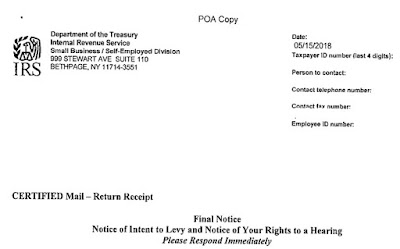I have gotten dragged into a rabbit hole.
I often get involved with clients on a one-off basis:
they are buying a company, selling their business, expanding into other states,
looking into oddball tax credits and so forth. Several of our clients have been
selling their businesses. In some cases, they have been offered crazy money by a
roll-up; in others it is the call of retirement. I was looking at the sale of a
liquor store last fall. As business sales go, it was not remarkable. The owner
is 75 years old and has been working there since he was a teenager. It was time.
The sale happened this year.
Fast forward to a few weeks ago. The CPA who works
with the liquor store was taking time off, but I was in the office. The owner
remembered me.
“Can I see you this afternoon,” he asked.
“Of course. Let me know what works for you.”
He brought an IRS notice of appointment with a field
revenue officer. I reviewed the notice: there was a payroll issue as well as an
issue with the annual deposit to retain a fiscal year.
I had an educated guess about the annual deposit. This
filing is required when a passthrough (think partnership or S corporation) has
a year-end other than December. We do not see many of these, as passthroughs
have mostly moved to calendar year-ends since the mid-eighties. The deposit is
a paper-file, and clients have become so used to electronic filing they
sometimes forget that some returns must still be filed via snail mail.
The payroll tax issue was more subtle. For some
reason, the IRS had not posted a deposit for quarter 4, 2022. This set a
penalty cascade into motion, as the IRS will unilaterally reorder subsequent
tax deposits. Let this reordering go on for a couple of quarters or more and
getting the matter corrected can border on a herculean task.
I spoke with the revenue officer. She sounded very
much like a new hire. Her manager was on the call with her. Yep, new hire.
Let’s start the routine:
“Your client owes a [fill in the blank] dollars. Can
they pay that today?”
“I disagree they owe that money. I suspect it is much
less, if they owe at all.”
“I see. Why do you say that?”
I gave my spiel.
“I see. Once again, do you want to make payment
arrangements?”
I have been through this many times, but it still
tests my patience.
“No, I will recap the liabilities and deposits for the
two quarters under discussion to assist your review. Once you credit the
suspended payroll deposit to Q4, you will see the numbers fall into place.”
“What about the 8752 (the deposit for the non-calendar
year-end)?
“I have record that it was prepared and provided to
the taxpayer. Was it not filed?”
“I am not seeing one filed.”
“These forms are daft, as they are filed in May
following the fiscal year in question. Let’s be precise which fiscal year is at
issue, and I will send you a copy. Do you want it signed?”
The manager chimes in: that is incorrect. Those forms
are due in December.”
Sigh.
New hire, poorly trained manager. Got it.
I ask for time to reply. I assemble documents, draft a
walkthrough narration, and fax it to the field revenue officer. I figure we
have one more call. Maybe the client owes a couple of bucks because … of course,
but we should be close.
Then I received the following:
I am not amused.
The IRS has misstepped. They escalated what did not
need to escalate, costing me additional time and the client additional professional
fees. Here is something not included when discussing additional IRS funding for
new hires: who is going to train the new hires? The brain drain at the IRS over
the last decade and a half has been brutal. It is debatable whether there remains
a deep enough lineup to properly train new hires in the numbers and time frame
being presented. What is realistic – half as many? Twice as long? Bring people
out of retirement to help with the training?
Mind you, I am pulling for the IRS. The better they do
their job the easier my job becomes. That said, there are realities. CPA firms
cannot find qualified hires in adequate numbers, and the situation does not
change by substituting one set of letters (fill-in whatever word-salad firm name
you want) for another (IRS). Money is an issue, of course, but money is not the
only issue. There are enormous societal changes at work.
What is our next procedural move?
I requested a CDP hearing.
The Collections Due Process hearing is a breather as
the IRS revs its Collections engines. It allows one to present alternatives to
default Collections, such as:
· An
offer in compromise
· An
installment agreement
I have no intention of presenting Collections
alternatives. If we owe a few dollars, I will ask the client to write a check
to the IRS. No, what I want is the right to dispute the amount of tax liability.
A liability still under examination by a field revenue
officer. I have agreed to nothing. I have not even had a follow-up phone call. A
word to the new hires: it is considered best practice – and courteous - to not surprise
the tax practitioner. A little social skill goes a long way.
The Notice of Intent to Levy was premature.
Someone was not properly trained.
Or supervised.
I question whether this would have happened 15 or more
years ago.
But then again, 15 years from now the new hires will be
the institutional memory at the IRS.
It is the years in between that are problematic.

